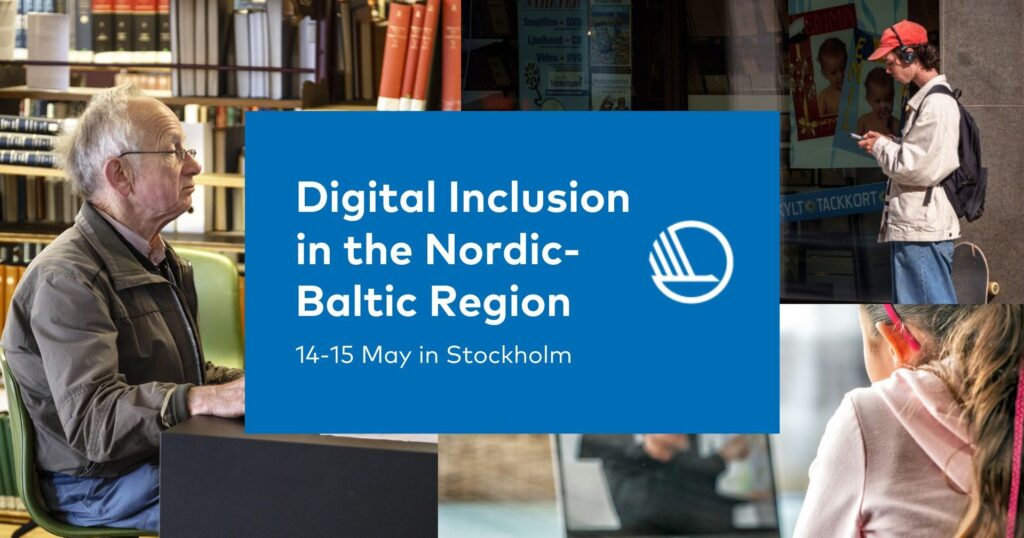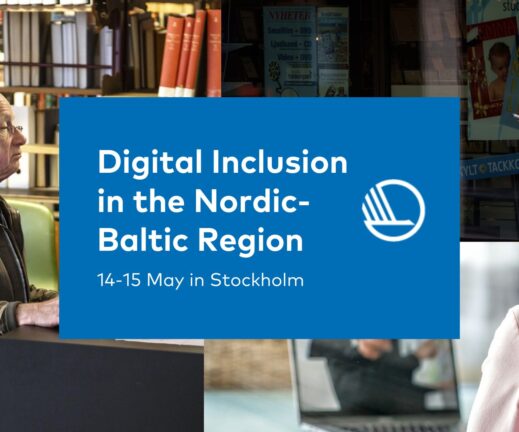During two half days, 14-15 May 2024, it is finally time for the “Digital Inclusion in the Nordic-Baltic Region – The Conference” where we will deep dive into the development in the Nordic and Baltic Region! What is the current status of digital inclusion policies, or the rollout of eID and what role does civil society play? This and much more is on the agenda when policymakers, practitioners, civil society, and academia gather in Stockholm.

We will showcase the outcomes of two years of research, highlighting the unique challenges and solutions specific to the Nordic-Baltic Region. As this event aims to foster collaboration, dialogue, and knowledge exchange – we need you in the room with us.
During the two days two reports, two studies and two new tools will be launched!
Programme
Tuesday, 14th of May
Starting 11:30 with check-in and lunch. The first day of the conference will tackle the question of “What characterises digital inclusion in the Nordic/Baltic region?” and “What can we do to reduce digital exclusion in the Nordic/Baltic region?”. Topics include discussions on the evolution of the political landscape concerning digital inclusion post Covid-19 in the Nordic and Baltic region, the status of digitalisation of the public sector, barriers and solutions of E-id roll out in the Nordic and Baltic region, the pivotal role of civil society actors in ensuring digital participation across all societal groups and, lastly, how can the political level work together with the civil society level.
| 11.30 | Arrival and lunch |
| 12.30 | Welcome to the conference! Our moderator Annika Östman, head of communications at Nordregio, opens the conference Rolf Elmér, Director at Nordregio, welcomes you |
| 12.45 | Official Opening of Conference Dan Sjöblom, Director-General of the Swedish Post and Telecom Authority (PTS) and Representative for the Swedish presidency of the Nordic Council of Ministers in 2024 |
| 13.00 | Setting the stage: What is the status of digital inclusion in the Nordic and Baltic societies? Talk 1: How does the digital inclusion politics landscape in the Nordic and Baltic countries look like: Policy initiatives post Covid-19 Sigrid Jessen, Researcher at Nordregio The already strong consensus in the Nordic and Baltic countries to prioritise digital inclusion became clear when the Covid-19 pandemic changed the everyday life for many. In this talk we will set stage regarding the political landscape in the Nordic and Baltic countries, with a specific emphasis on the more the 20 new policy initiatives developed post Covid-19: What are the main characteristics, similarities and differences across the regions? Talk 2: Launch of the DigiLaw report Professor Hanne Marie Motzfeldt, Copenhagen University The DigiLaw report examines how the common Nordic values, such as legal certainty and trust in the public sector can be preserved, while citizens still obtain the benefits of a more digital public sector. Be the first to gain insights from the results of research project “Nordic Public Digitalisation and Rule of Law in the Nordic and Baltic countries”! |
| 13.40 | Group discussion: What are the main barriers for digital inclusion in your country? |
| 14.05 | eID roll out in the Nordic and Baltic region: Barriers and solutions Talk 3: Barriers and solutions to eID roll in the Nordic and Baltic Region Herman Alexander Ruud Walby and Ismail Özkan, Advisors at The Norwegian Digitalisation Agency eIDs are required to participate in many aspects of everyday life, from banking, to health services and much more. An expert working group within the NOBID project has mapped out the challenges various user groups face with eIDs in the Nordic and Baltic countries, and how they answer to them. Talk 4: eID roll out in Greenland, Faroe Islands, and Åland: Presentation of the fieldwork Maja Brynteson, Researcher at Nordregio We will present how the three autonomous regions are working to include their citizens in the digital transformation that eID enables. What obstacles and hindrances have they faced, and what solutions are implemented? Nordregio has carried out fieldwork that will shed light on areas previously overlooked in the bigger scope of digitalisation, to present the views of people working with the respective eIDs. |
| 15.00 | Group discussion & coffee Transferability: To what extent can solutions regarding barriers to eID rollout be transferred between the Nordic and Baltic countries? |
| 15.25 | What is the role of civil society actors in achieving digital inclusion? Talk 5: Launch of storymaps on civil society actors in the Nordic and Baltic region Sigrid Jessen, Researcher at Nordregio Civil society actors are being increasingly recognised in politics targeting digital exclusion. Nordregio has interviewed 25 different NGOs and civil society organisations about their role in driving digital inclusion, and the road ahead. The results will be presented here! Panel Discussion: What role do civil society actors play in the Nordic and Baltic context? What can we do to improve the circumstances for the Civil Society Actors? How can the political level work together with the civil society level? Participants: Inga Björk Margrétar Bjarnadótti, disability rights expert and doctoral candidate at the University of Iceland. Through her work with NGOs and as an activist, she has advocated for digital accessibility and has received awards from the IT Society of Iceland and the City of Reykjavík for her contributions to digital inclusion. Michala Høg Daimar, Head of secretariat at the Office for Inclusion and Digital Services at the Danish Agency for Digital Government. Responsible for the Danish Network for Digital Inclusion, a network for NGOs established in 2015 by the Danish Agency for Digital Government. Today, the network consists of approximately 90 organisations or others that work with citizens who experience challenges in being digital. Rita Šukytė, Director of the association “Langas į ateitį“ (Window to the Future), an NGO working in the field of information society development in Lithuania. Rita has over 15 years of experience implementing the initiatives of ICT training, encouragement to use e-services, and internet safety awareness raising. |
| 16.45 | Group discussion: How can we ensure inclusive policies regarding digital inclusion with representation of relevant groups? |
| 17.15 | Wrap up of the first day of the conference |
Wednesday, 15th of May
The second day of the conference dive into the questions of “How will digital inclusion/exclusion develop in the future in the Nordic/Baltic region?” and “What are the future steps that needs to be taken?”. Topics include talks on the future skills and capabilities required for achieving digital inclusion and the future role of adult learning in digital inclusion, discussions on how to improve and future proof strategies for monitoring and evaluating digital inclusion in the Nordic and Baltic region, and digital inclusion in the era of industry 4.0. Ending at 13:00 with a lunch.
| 8.30 | Arrival and coffee |
| 8.45 | Welcome to the second day of the conference! Annika Östman, Nordregio |
| 9.00 | Skills and digital capabilities in the Nordic and Baltic region Talk 6: Why are we not all digitalised yet and whose fault is it? The future of adult learning in digital inclusion Johanni Larjanko, journalist and coordinator at Nordic Network for Adult Learning It’s time we stop blaming people for not being digital and start addressing the many barriers they face. In this presentation you will gain some insight into how this can be done, what research tells us, and what role adult learning can play. By shifting our perspective from people as problems we need to solve towards people as part of the solution, we are already making progress. And then we offer you a toolbox. |
| 09.30 | How to monitor digital inclusion? Talk 7: Broadening the scope: The global effort to measure digital inclusion using standardised metrics Matthew Sharp, Senior postdoctoral researcher at University of Oxford In this presentation, Matthew will discuss the important but challenging task faced by international organisations and research institutions to measure digital inclusion across countries through standardised metrics. He will highlight key findings from a detailed empirical analysis of these metrics focused on regions beyond the Nordic and Baltic countries, and will suggest some ideas to improve these metrics. Talk 8: Launch of tool for indicator mapping in the Nordic and Baltic countries Anna Vasilevskaya, GIS Analyst at Nordregio Anna Vasilevskaya will launch and present the tool created by Nordregio. The online interactive tool shows the factors related to digital inclusion in the Nordic and Baltic countries. The tool provides insights on the indicators and mechanisms behind digital inequality specific for the region, and demonstrates a Multidimensional Digital Inclusion Index (MDII) developed in this project. |
| 10.00 | Indicator Lab: Test of tool, discussion, and coffee: Usage and feedback on tool for indicators for mapping digital inclusion across the Nordic-Baltic |
| 10.45 | Future trends: Digital inclusion in the era of industry 4.0 Talk 9: Digital inclusion in the era of AI Associate Professor Massimo Ragnedda, Northumbria University & Sharjah University (UAE) Massimo Ragnedda’s talk focuses on the importance of promoting digital equity and inclusion in an AI-driven future. As Artificial Intelligence (AI) gains prominence, there is a risk of further marginalizing the digital underclass. This discussion aims to shed light on strategies to prevent such disparities and ensure a more inclusive digital landscape. |
| 11.15 | Group discussion: What are the potentials and potential fall pits with the emergence of new technologies? What should we pay extra attention to in the future? |
| 12.00 | What potential does Nordic and Baltic collaboration have for digital inclusion in the future? Reflections from the conference and strategic next steps forward. These discussions will form basis for a declaration with the main lessons learnt regarding the development and future steps needed to be taken for digital inclusion and how the Nordic-Baltic collaboration can strengthen each other in this process. |
| 12.45 | Wrap up of the conference Cecilia Leveaux, Senior Adviser Digitalisation, Nordic Council of Ministers |
| 13.00 | Goodbye lunch |
General info:
This event is a physical event only, and will not be live streamed.
The event is in English.
Participation is free of charge, but we do not cover travel costs or accommodation.
Meals that are included: lunch on both days, fika on both days.
Registration is closed. Please send an email to louise.ogland@nordregio.org if you have any questions.



